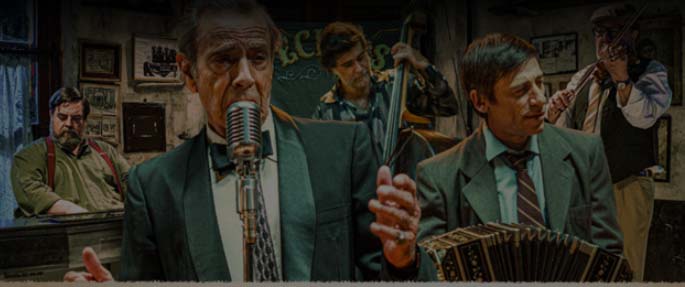By Lucy Komisar
Director Germán Kral’s fine Adiós Buenos Aires is a realistic and sensitive look at the lives of working-class Argentines desperately trying to survive and even prosper in the face of a government that does little for their welfare and, to top that, suddenly in 2001 limits withdrawals from their own bank accounts. All true. But the film is not depressing. It’s warm and appealing.

Julio (the charming Diego Cremonesi) plays the concertina-style bandoneon in a tango band. (We get to hear that riveting soulful sound which started in bordellos and became the musical heart of the country.) Even running the shoe shop his father left him, he can’t pay the bills and decides to move to Germany to start over.
But the car he will sell to buy the plane ticket is seriously damaged by taxi driver Mariela (the tough feminist Marina Bellati), who runs a red light and has no insurance. She has a kid and her own survival difficulties.
Kral keeps the political story on top – including the solidarity of the tango band players — where an American director would have suffocated it with the romance we know will happen, but only in time.
The 2001 bank freeze was ordered by Domingo Cavallo, economy minister in two conservative governments, to stop a bank run. Of course, it was the government’s huge IMF borrowing which created a financial crisis. The poor would bear the brunt, because the freeze didn’t affect credit cards and electronic transfers, which would have inconvenienced the wealthy. Mass protests spawned riots and led to the fall of the president.
As band members in the film say, the government is corrupt. And that ethic infects those below. Julio’s friend, supposed to fix the car, instead strips it of wheels and motor. Julio can’t buy a plane ticket, but he gets a job on a ship headed for Europe. The dénouement is surprising. I file it under “solidarity.”
Kral was born in 1968 in Buenos Aires and went to Germany in 1991 to study at the Munich Film School. He lives in Munich and Buenos Aires. Far-right-winger Javier Milei is the new Argentine president, and there are protests against his anti-worker policies. If we are lucky, that will inspire Kral to do another film!
Currently at Cinema Village 22 East 12th Street in New York City.



Wow!